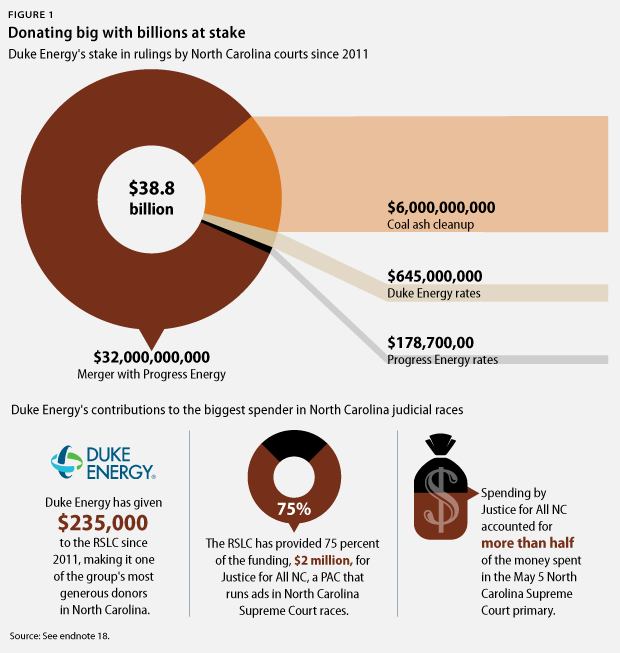North Carolina Gov. Pat McCrory (R) signed a bill on August 12, 2013, eliminating the state’s innovative public financing program for judicial elections, which gave candidates several hundred thousand dollars for their campaigns if they qualified by raising small donations. This system muted the influence of deep-pocketed campaign donors for more than a decade, but Art Pope—McCrory’s former budget director and a millionaire campaign donor—targeted it for elimination. The repeal of the program will give corporate campaign donors such as Duke Energy more influence in judicial elections.
Public financing worked
An upcoming report from the Center for American Progress examines the success rates of law firms that appeared before the North Carolina Supreme Court from 1998 to 2006 and also made contributions to the justices’ campaigns. The study showed very high success rates for attorney donors with more than five cases before the bench who gave at least $1,000, but these rates dropped from 71 percent in 1998 to 62 percent in 2004—the first year that the public financing system was in place.
Duke Energy and other corporations give big in judicial races
This year will be the first time in a decade that North Carolina Supreme Court candidates have to raise large amounts of campaign cash—much of it in large donations from attorneys and corporations with a financial interest in the court’s rulings:
- The May 5 primary election saw an unprecedented $1.3 million in spending—all from private donors—for the only contested seat.
- Nearly half of this money came from the Republican State Leadership Committee, or RSLC, a group based in Washington, D.C., that helps elect Republican legislators.
- One of the biggest donors to the RSLC in North Carolina is Duke Energy, the country’s largest electric utility. Duke Energy has had an enormous financial stake in rulings by North Carolina courts since 2011. The company has faced judicial review of two rate increases for customers, its $32 billion merger with Progress Energy, and its expensive obligation to clean up toxic coal ash.

Clean water is at stake in North Carolina courts
Duke Energy produced $24 billion in revenue in 2013, and the company wields enormous influence in North Carolina. Gov. McCrory, a Duke Energy executive for 28 years, secretly held on to Duke Energy stock after he took office in 2013, while failing to report the assets as required by law.
The links between Duke Energy and Gov. McCrory’s administration have been scrutinized since February 2014, when a ruptured pipe at one of Duke Energy’s power plants released 39,000 tons of toxic coal ash slurry into the Dan River, a source of drinking water for more than 42,000 people in North Carolina and Virginia. But the spill is not the only time Duke Energy has endangered drinking water:
- Clean water advocates have found toxins in groundwater near all 14 of Duke Energy’s coal-fired plants in North Carolina.
- One young resident near a recently retired plant, 11-year-old Anna Behnke, reportedly told Duke Energy’s former CEO, “I go to bed every night scared that I could get cancer from that [power] plant.”
- The state legislature recently passed a bill to more stringently regulate coal ash, but the Southern Environmental Law Center said it did not go far enough. The bill creates a commission to determine how Duke Energy must clean up the coal ash ponds, but Gov. McCrory has said he will challenge this provision in state court.
Some North Carolinians have already taken Duke to court, asking judges to order the company to mitigate the risks to their drinking water. At the same time, Duke Energy gave big to the RSLC, which is running ads to keep the conservative majority on the state supreme court. Without public financing, campaign contributors such as Duke Energy will have more opportunities to try to buy influence in the state courts.
Legislators must reinstate public financing
Citizens must demand that legislators create another public financing system to keep corporations and attorneys from trying to curry favor through judicial campaign cash. Retired Chief Justice Sarah Parker recently warned, “If people perceive that our courts are for sale, they will lose confidence in the ability of courts to be fair and impartial. … We must have judges committed to the rule of law … without regard to politics, special interests or personal agenda.”
To do this, the legislature would have to craft a system that is constitutional and effective in this era of unlimited independent spending. A small-donor matching system that multiplies small donations with larger contributions from public funds would amplify the impact of small contributions and give candidates flexibility. Such a program would mitigate the appearance of bias or impropriety in the courts.
Billy Corriher is the Director of Research for Legal Progress at the Center for American Progress. Sean Wright is a Policy Analyst at Legal Progress.